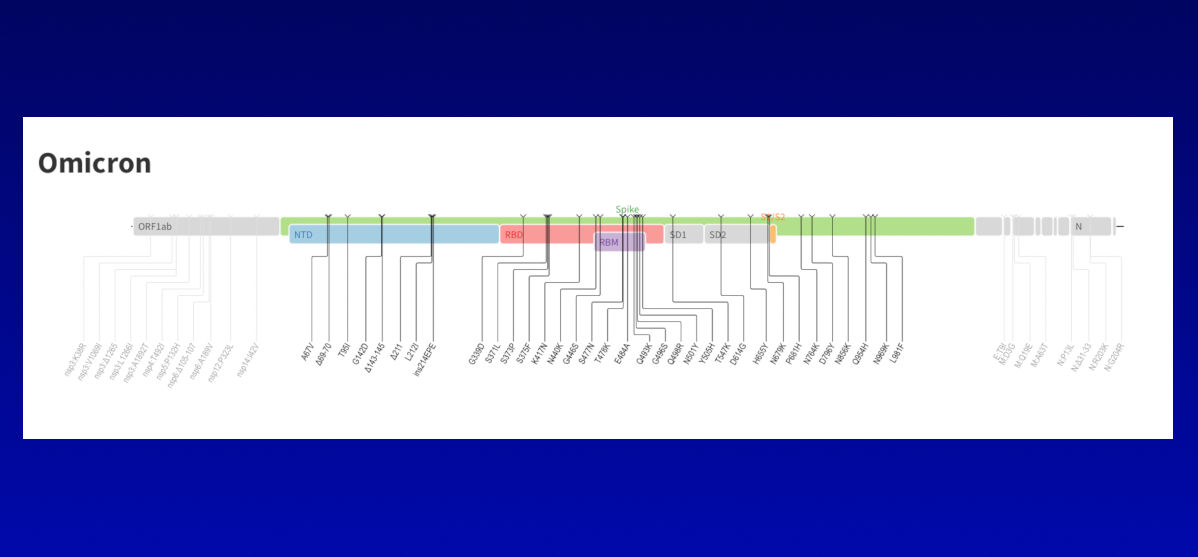On Friday, the World Health Organization (WHO) released information on a new version of the virus that causes Covid-19. The new variant, which has been named “Omicron”, was first spotted in South Africa. Countries around the world are now racing to prepare for Omicron.
Governments around the world reacted this weekend after the WHO released information on a new variant. Not much is known about the variant, except that it has many “mutations” (changes) from the original SARS-CoV-2 virus. Though there’s much to learn, scientists worry that with so many changes, the new variant of the virus might spread more easily. It’s also possible that the current vaccines may not work as well against it.

(Source: [CC BY-SA 4.0], Stanford University.)
Variants
A “variant” happens when a virus changes slightly. Most variants don’t cause problems. The WHO gives names to coronavirus variants that have caused or could cause problems. These are known as “variants of interest” or, if they could be very serious, like Omicron, they’re called “variants of concern”.
These variants are given names from the Greek alphabet. That makes them easier to talk about, and helps prevent people from blaming a certain part of the world for the variant. Delta is currently the most common variant around the world. Some scientists think Omicron could spread like Delta.
The Omicron variant was first discovered in South Africa. Doctors there noticed that patients were complaining of being extremely tired and sore. South African scientists discovered that the virus causing the illnesses was a new variant. The response in South Africa and from the WHO was so quick that very little is known about the Omicron because it’s still so new.
😕
This image has not been loaded because of your cookie choices. To view the content, you can accept 'Non-necessary' cookies.
The Omicron variant was first discovered in South Africa. South African scientists discovered that the virus causing the illnesses was a new variant. Above, a worker at a South African Covid-19 testing lab.
Even without much information, countries around the world have acted quickly. Most don’t want to take chances in case the variant does turn out to be serious. Already, many countries around the world have blocked travel to and from many nations in southern Africa. Some countries have stopped all foreign travelers from entering.
Many people question whether these travel bans will work. The Omicron variant has already been found in at least 11 countries around the world, including Australia, Belgium, Germany, and the United Kingdom.
😕
This image has not been loaded because of your cookie choices. To view the content, you can accept 'Non-necessary' cookies.
Already, many countries around the world have blocked travel to and from many nations in southern Africa. Some countries have stopped all foreign travelers from entering. Above, international passengers at London’s Heathrow airport.
Based on how previous variants have spread, experts say travel bans won’t stop the variant. But the bans could delay the arrival of the variant in great numbers, allowing time for scientists to learn more about Omicron, and giving countries longer to prepare.
Questions Scientists Want to Answer About Omicron:
• Does it spread more easily?
• Are the effects from the Omicron variant more serious or less serious?
• How well do the vaccines work against Omicron?
• Will the vaccines need to be changed to fight Omicron better?
• Can people who’ve already gotten the coronavirus still be infected by Omicron?
The South African government is upset about the travel bans. The government says it feels like the country is being punished for detecting the variant and bringing it to the WHO’s attention. “Excellent science should be applauded [clapped for] and not punished,” the country’s foreign ministry said in a statement.
😕
This image has not been loaded because of your cookie choices. To view the content, you can accept 'Non-necessary' cookies.
The South African government is upset about the travel bans, saying it feels like the country is being punished for detecting the variant and bringing it to the WHO’s attention. President Cyril Ramaphosa, shown above in September, said he was “deeply disappointed” by the bans.
Many experts around the world agree. They say when countries react to news like this with travel bans, it makes other countries less likely to report new variants in the future.
No matter what scientists find out about Omicron, most of the normal methods will still help reduce its spread. These methods include wearing masks in public indoor places, and social distancing. Since Omicron spreads more easily in places where most people aren’t vaccinated, getting vaccinated, if possible, is also an important step to take.
Did You Know…?
In choosing the name “Omicron”, the WHO skipped two letters of the Greek alphabet, “nu” and “xi”. Nu was skipped because it could be confused with “new” and xi was skipped because it’s a common name in China.
